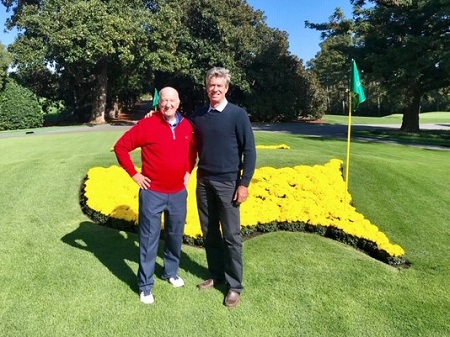Editor’s Note: Advisory panelist Mark Skousen, Ph.D., recently appeared on CNBC with Rick Santelli to share his views on gross output and the economy. Watch his full interview here and share your thoughts with us in the comments.
– Christina Grieves, Senior Managing Editor
“The greatest lesson in life is to know that even fools are right sometimes.”
– Winston Churchill
Both Alex Green and I love to play golf. We had the opportunity of a lifetime to play Augusta National last November as guests of a longtime member and subscriber of mine.
Many players like to bet on a single hole or a round of golf, but I knew it would be a fool’s errand for me to bet against Alex, who used to be a pro at St Andrews Golf Course. He’s what one might call a “scratch golfer.” Me? I’m a hacker who doesn’t even keep score.
But both of us were thrilled to see Tiger Woods redeem himself and make the miraculous comeback of a lifetime when he won the Masters two weeks ago for the first time in 14 years. It was his lucky day.
Speaking of luck, last week it was reported that day trader James Adducci, 39, bet that Tiger Woods would win the Masters golf tournament.
It was a 14-to-1 gamble that paid off.
With the blessing of his wife, Adducci flew from his home in Wisconsin to Las Vegas and placed an $85,000 cash wager that turned into a $1.2 million check after Woods won by a stroke.
Adducci himself almost had a stroke when Tiger went down by three shots after his bogey at the fifth hole. But he never lost faith, he said.
Mind you, this was a man with a mortgage on his house, two student loans and two car loans taking a chance on a golfer who had suffered one setback after another over the past dozen years. He had never done a sports wager in his entire life. He raised all the cash he could and made a singular bet.
Was it a smart move?
I asked a seasoned sport handicapper about betting on Tiger. He responded, “I just wouldn’t place a big bet with those kinds of odds.”
But Adducci had a gut feeling that Woods would pull it off. “I just thought it was predestined for him to win,” he told Golf Digest. “It wasn’t about the stats for me. The fact that this was going to be his first major in front of his kids, I was convinced he would win.”
I would say he was just lucky – damn lucky.
Reason vs. Emotion: Which Is Best?
The story of Adducci raises the question: Should you rely on your instincts, gut feelings or a hunch when it comes to investing?
When I teach my financial economics course at Chapman University, we have a debate on which is better when it comes to making investment decisions: reason or emotion, the mind or the heart?
Based on my longtime experience as an investor and investment advisor, I firmly believe that the best way to make buy and sell decisions is researching and thinking it through rather than acting on sudden emotional feelings or hunches.
Otherwise, you may end up buying at the top and selling at the bottom. Or picking the wrong stock.
For every James Adducci-like winner out there, there are a hundred speculators who trade based on gut feelings and lose.
Advice From Old-Timers on Wall Street
Many Wall Street veterans have counseled the same advice.
Gerald Loeb, author of The Battle for Investment Survival, warns, “Look at investments completely coldly, allowing no sentiment to play any part.”
In his book How to Be Rich, J. Paul Getty – America’s first billionaire – wrote, “The big profits go to the intelligent, careful and patient investor, not to the reckless and overeager speculator.”
Joe Kennedy was a fabulous speculator who made millions during the 1920s and 1930s. A biographer says that he had an ideal temperament for speculating: “a passion for facts, a complete lack of sentiment, a marvelous sense of timing.” Kennedy once said, “There is no more dangerous illusion than the belief that one can get something for nothing.”
And Jack Bogle, founder of the Vanguard index funds, has cautioned, “Time is your friend; impulse is your enemy.”
(As a side note, all of the above quotes can be found in the latest edition of my book Maxims of Wall Street.)
Now that Adducci has made his million, what advice would I give him? To make it big, you have to concentrate; to keep it, you should diversify.
If he were smart, he would spread his risk investing in stock index funds and other conservative stocks. Because his chances of winning it big again on a sports bet or penny stock are nil.
Good investing, AEIOU,
Mark
Mark Skousen is a true believer in reason, self-determination, hard work and liberty. Since 1980, Mark has been the editor-in-chief of the award-winning investment newsletter Forecasts & Strategies. He’s a successful author and publisher of several books, including The Maxims of Wall Street and Investing in One Lesson. He is also the founder of FreedomFest, an annual gathering in Las Vegas of the freedom movement from around the world.
